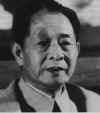Hu Yaobang
|
|
Hu Yaobang (Chinese: 胡耀邦 Wade-Giles: Hu Yao-pang) (November 20, 1915 – April 15, 1989) was a leader of the People's Republic of China.
Born in Linyang City, Hunan province to a poor peasant family, Hu left home at age 14 to join the Chinese Communist forces, becoming a member of the Communist Party of China in 1933. He participated in the Long March and served as a political officer in the Chinese Red Army under Deng Xiaoping. After the founding of the People's Republic he headed the Communist Youth League. He held many positions in the party and became an important political leader in the CPC after the Cultural Revolution.
As Deng Xiaoping gradually regained control over the CCP, Deng's rival Hua Guofeng was replaced by Zhao Ziyang as Premier of the People's Republic of China in 1980, and by Hu Yaobang as Party Chairman in 1981. Hu was also made General Secretary of the Communist Party of China in 1980 but, until the mid-1990s, it was Deng who was the most influential Chinese leader although his sole official title was that of chairman of the Communist Party's Central Military Commission.
Although Hu was a dedicated reformer and one of Deng Xiaoping's most important associates, he was later forced to resign in 1987 from his post as the General Secretary of the Communist Party of China; Deng forced Hu to resign because Hu failed to control the student demonstrations in 1986.
Hu Yaobang passed away due to a heart attack two years later on April 15, 1989. His death helped spark the Tiananmen Square protests of 1989.
See also:
| Preceded by: Hua Guofeng | Chairman of the Communist Party of China 1981–1982 | Succeeded by: none (position abolished) |
| Preceded by: Deng Xiaoping (position vacant since 1957) | General Secretary of the Communist Party of China 1980–1987 | Succeeded by: Zhao Ziyang |

